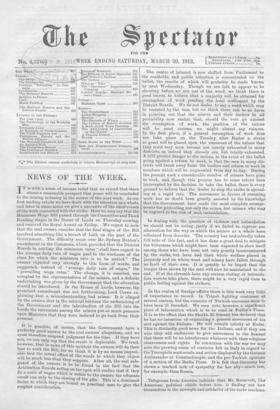The centre of interest is now shifted from Parliament to
the coalfields, and public attention is concentrated on the ballot, the results of which will probably be made known by next Wednesday. Though we are loth to appear to be shouting before we are out of the wood, we think there is good reason to believe that a majority will be obtained for resumption of work pending the local settlement by the District Boards. We do not desire to say a word which may be resented by the men, but we think there can be no harm in pointing out that the miners and their leaders in all probability now realize that, should the vote go against the resumption of work, the position of the unions will be most serious, we might almost say ruinous. In the first place, if a general resumption of work does not take place on the Tuesday after Easter a strain so great will be placed upon the resources of the unions that they must very soon become not merely exhausted in many districts, as indeed they already are, but totally exhausted. A still greater danger to the unions, in the event of the ballot going against a return to work, is that the men in many dis- tricts will break away from the leaders and return to work in numbers which will be augmented from day to day. During the present week a considerable number of miners have gone to work, and, though this process has to some extent been interrupted by the decision to take the ballot, there is every ground to believe that the desire to stop the strike is spread- ing at a rapid rate. The movement in favour of resuming work has no doubt been greatly assisted by the knowledge that the Government have made the most complete arrange- ments for protecting not only the mines, but miners who may be exposed to the risk of mob intimidation.






































